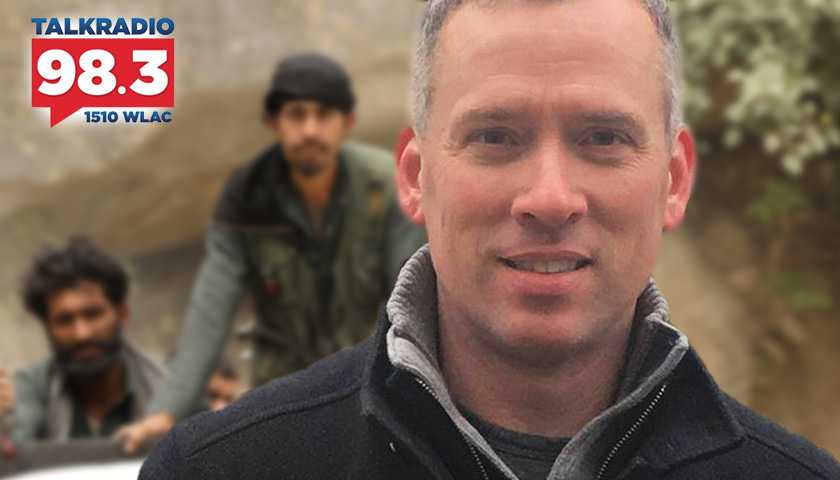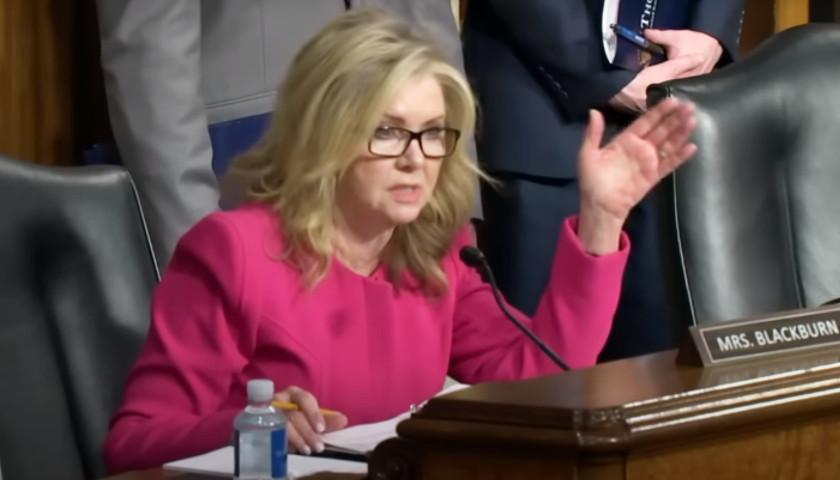Live from Music Row Monday morning on The Tennessee Star Report with Michael Patrick Leahy – broadcast on Nashville’s Talk Radio 98.3 and 1510 WLAC weekdays from 5:00 a.m. to 8:00 a.m. – host Leahy welcomed Lt. Col. Jonathon Myers, a retired Marine intelligence officer and author of American to the Corps to the newsmakers line to discuss his efforts to rescue stranded American citizens in the wake of the abrupt withdrawal from Afghanistan.
Leahy: We welcome to our newsmaker line. Retired Lieutenant Colonel Jonathan Myers, a retired Marine intelligence officer who’s been trying to get Americans and green card holders out of Afghanistan without a lot of help from the Biden administration or the State Department. Welcome, Colonel Myers.
Myers: Thanks for having me. Good morning.
Leahy: Good morning. So tell me, where does this stand? How many have you been able to get out and how many are stranded and why is the State Department not helped?
Myers: Those are all excellent questions. And I wish I had to answer to all of them. Initially, when the U.S. was still there, we were quite successful and able to get out hundreds, if not thousands.
We were acting as a conduit between the informal network of Marines worldwide and the Marines conducting the mission. Once the U.S. pulled out rather abruptly, it’s honestly been very difficult. And the State Department has stood in our way several times, as well as the Taliban.
And currently, the numbers that you’re hearing are not quite accurate. I know my team alone has 115 American citizens or direct family members of American citizens that we are tracking who are in hiding and still wanting to evacuate.
Leahy: And when you tell your private effort, how is this being funded by the way? Are you doing it out of your own pocket? How is your effort being funded?
Myers: Our effort is being funded by deep-pocketed veterans, individual veterans as well as veteran groups, but they can’t go on forever. These airplanes were expensive.
It’s very expensive to keep the potential evacuees safe and keep them fed. It doesn’t have an indefinite timeline. And eventually, the clock is going to run out.
Leahy: Do you need more money from Americans to help out here?
Myers: Well, yeah. I’m taking donations via my social media and my teammates. My team is three Marines that we’re working in close coordination with the Pineapple Group. And we have been gathering money to directly feed the families that we have in hiding up north, which constitutes hundreds and hundreds of people.
And in combination with Mr. Beck’s group and the other airplanes, we’re over 1000 or 1200 people. We are trying to feed them and keep them taken care of.
Leahy: Where does this go from here?
Myers: You know, it’s difficult to say. I’m still not quite sure what the State Department is doing if anything. I know that the planes are still being held up north. I know it’s fallen out of the media, but the people are still there.
The planes are still there. The Taliban are holding us up to some extent at the local level there at the airport. But at the higher international level, it’s really been in the State Department throwing up roadblocks for us.
Leahy: Why is the State Department not helping get Americans out of Afghanistan?
Myers: I can’t answer that question. To me, it almost seems like sort of if we can’t rescue them, then nobody’s going to be allowed to rescue them. That seems to be what’s been happening to us since the U.S left.
Leahy: Your last job before you retired, you worked with the chairman of the Joint Chiefs of Staff, Milley. Is that correct?
Myers: Yes. I was 28 years as a Marine Corp. Intelligence officer. My last assignment was as an intelligence officer on General Milley’s staff on the Joint Staff there in Washington, D.C. And that’s where I retired out of and then moved here. I live in Europe because of my wife’s job assignment.
And in no way did I anticipate myself and two of my Marine colleagues stepping in for the U.S. State Department and Department of Defense trying to evacuate all the American citizens out of Afghanistan. It’s just really a surreal situation.
Leahy: Is General Milley as big a weasel as he looks like to me?
Myers: (Chuckles) I can’t really, I have no comment on that. I didn’t really have that sort of interaction with him. And I left before any of this started. The controversies hadn’t really erupted regarding General Milley.
Leahy: So I guess you would say you are surprised at his and the State Department’s failures in regard to the Afghanistan debacle.
Myers: Absolutely. Just overall, the level of shock is just intense. The fact that we would just up and go and abandon all these American citizens. And then that informal group of veterans such as myself and my two teammates, Katie Garroway, and Rico Reyes, that we would have to step in and do this.
It’s just absolutely shocking. And the fact that even to this day, we’re still fighting against our own government to try and get these people out. and let me make it known, it’s very important, understand, these are not gatecrashers.
This is not the first day with the C17. These are all people that were nominated to us by American servicemen and women who served in Afghanistan. These are people who are known and did work for the United States.
Leahy: Some of these people are American citizens and some are people that are interpreters and people that helped us here that are Afghanistan. Is that correct?
Myers: Yes. Absolutely. There’s still a large number of American citizens. As I said, we have 115 as of this morning that we’re tracking who are in hiding and desperately want to get out.
And there have been news reports of Qatar Airways flights. And I can only confirm that one of my American citizens made it out on one of those flights, and the plane was empty for the most part. I don’t know about any more than 20 people who have gotten out that way.
Leahy: Now, there’s a story in The Washington Examiner, which you told them about, ‘One desperate 17-year-old boy who was told to wear a white shirt and pink bandana. He got to the airport. They saw him.
He had to jump into a sewage canal full of feces and swim across it. He showed his passport and they pulled him over the wall. Did that kid make it out?
Myers: That particular person did make it over the wall and made it out. We also sent a couple of families using that methodology, which again, is just unreal. This was during that last 72 hours when it seemed to me that they had been told not to take as many citizens or evacuees as they had been.
So we were resorting to very extreme measures to try to get people over the wall. And in this case, we had developed a methodology where we had them wear identifying clothes, and then the Marines would spot them, and they would make a dash for the canal and jump in and then get pulled over the wall. And we did that a few times.
Leahy: Now, this 17-year-old boy, an American citizen, where’s the rest of his family?
Myers: I don’t know the whole story behind that one. I’m not sure that 17 is the right age. I know he was an older teenager, but there have been too many. There’s been thousands, hundreds, if not thousands. So it’s hard to keep track.
And once we have a success story and we know that they’re over the wall, or at that time when we knew they got over the wall, we moved on to the next case. Usually American families.
Leahy: You’re also a student of history. Has any American administration ever abandoned Americans knowingly behind enemy lines?
Myers: No. The worst case that I can think of would be Vietnam, where we left allies behind. But we did make a significant effort to get the Montagnard tribesmen who were our fierce allies out.
And I know they were re-established in Texas and Louisiana. And now they are heavy in the fishing industry. But we didn’t leave Americans behind in Vietnam. This is unprecedented.
Leahy: All of this coming together, it seems to be not just incompetence, but an intentional effort by the Biden administration to show American weakness and betray the American values in Afghanistan. Do you see it that way or not?
Myers: What I see it as is I think that they had a political objective. And although they were getting national security experts telling them what the ramifications would be immediately withdrawing, I think the political objective of putting a nice bow on it before September 11th and being able to claim some sort of political victory overweighed the strategic intelligence and security information they were getting. And that’s where I think the fault lies in that the political infection of the national security apparatus is what caused this.
Leahy: Is it just the national security apparatus, or is it in the entire top level of the American military? It looks to me like we don’t know how to win wars anymore.
Myers: Yes. It’s becoming difficult. It’s for sure that politics plays a much heavier role in national security decisions now than it ever has. And I also think that the political appointment process has become much more politicized than it ever was in the past almost to the point where there’s no vetting to ensure the people who are running our national security apparatus are even qualified.
I know of two very, very senior levels, I won’t name them. One who’s a political campaign donation bundler and the other who was an Elizabeth Warren campaign staffer. And they now hold some of the most senior national security decision-making posts in the U.S. government.
Leahy: For people to help you, give us your social media so they can go if they want to make a donation to help you.
Myers: I’m just on Facebook. My page is public. Jonathan Myers. There’s a picture of a Marine.
Leahy: Jonathan Myers is Lt. Colonel, Retired U.S. Marine, thanks so much for joining us. And best of luck in your effort, we really appreciate all of your good work there.
Myers: Okay. Thank you for having me.
Listen to the second hour here:
– – –
Tune in weekdays from 5:00 – 8:00 a.m. to the Tennessee Star Report with Michael Patrick Leahy on Talk Radio 98.3 FM WLAC 1510. Listen online at iHeart Radio.
Photo “Jonathon Myers” by Jonathon Myers.





